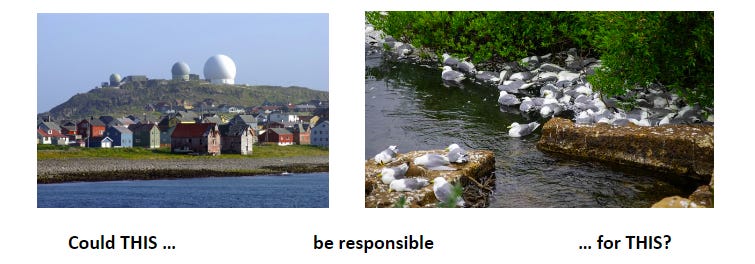Are We Facing a Global ‘Bird Armageddon’?
It's time we start paying attention to the “catastrophic declines” of bird populations around the world. The numbers being reported are simply tragic. What does it mean?
Written by World Council for Health Correspondent Alice Ashwell, PhD.
On 17 October 2023, Arthur Firstenberg published a concerning article [1] on his Substack, drawing attention to reports of “catastrophic declines” around the world, mainly of bird populations, but also of other animals such as marine mammals and insects. This summary raises some of the key issues. It is also an invitation to visit Arthur’s Substack and read the full account.
Tragic losses
Firstenberg’s article references huge declines in bird populations on five continents, in places as widespread as Norway, the Netherlands, France, Greece, Romania, Tibet, Britain, North America, Chile, and Peru.
The numbers are simply tragic, with most reports listing tens of thousands of birds dying within relatively short periods. But it’s not just the numbers; it’s the proportions of total populations that these numbers represent: 13% of Chile’s Humboldt penguins; 30% of Norway’s endangered kittiwakes; 36% of Peruvian pelicans; and 40% of Dalmatian pelicans nesting in Greece, to mention a few.
What’s the culprit?
Predictably, in this era of pandemic panic-mongering, one of the first answers to this question is bound to be ‘bird flu’. But this has not been confirmed by testing. In one study cited, out of 233 dead birds examined by the Norwegian Veterinary Institute between August and October 2023, 207 birds (88.8%) tested negative for any influenza viruses. The remaining 26 birds carried a range of variants of influenza viruses, including Influenza A and various subtypes of H5Nx.
Despite it being clear that there was no single viral strain in circulation, Firstenberg states that “… the United States is already stockpiling a vaccine against H5N1 in case it spreads to human beings and causes a pandemic.” [2]
There are also concerns that birds are being killed by wind farms, with the journal Nature publishing an article in April 2023 reporting on the decline in populations of red-throated loons in the North Sea after construction of offshore wind farms [3]. Shockingly, populations declined by an average of 94% within one kilometre of a wind farm, and impacts were recorded as far as 24 kilometres away. Concerns are also mounting that wind farms are killing whales [4], with legislators in New Jersey calling for an immediate moratorium on offshore wind farms after over 30 dead whales washed up recently on the US east coast.
Having done considerable research for his book The Invisible Rainbow: A History of Electricity and Life, Firstenberg refutes the theory that viruses cause influenza, or that this is a contagious disease [5]. He points instead to the relationship between the rollout of technologies like radar and cellphone transmitters that emit electromagnetic frequencies (emfs) and pandemic influenza outbreaks, starting with the ‘Spanish flu’ of 1918 [6]. An entire chapter in his book focuses on the impacts of emfs on birds. These creatures are exquisitely sensitive to emfs, which have been shown, for example, to disrupt their navigational systems.
It's time to respond
It is clearly not in the interests of the telecommunications industry, the military, or any of the industries and interests that rely upon the ever-increasing expansion of emf-based technologies to question their impact on living organisms – including human beings. But just like the proverbial ‘canaries in coalmines’ used by miners in the past to warn them of toxic levels of carbon monoxide, birds continue to warn us of invisible threats to which we too are vulnerable.
While the authorities and corporate interests remain wilfully blind to these concerns, Firstenberg reminds us that communities can make a difference at a local level. Having learnt from a scientific survey and review carried out in 2017 [7] about the many dangers to animals and plants posed by cellphone towers, an Indian village resolved to prohibit the installation of cell towers to protect the Openbill Storks that nest in trees in the village.
The lack of willingness to honestly investigate the impacts of emf technologies on living systems is matched by the lack of transparency regarding the origins of Covid-19. Keeping the mechanisms of these existential threats shrouded in mystery creates fertile ground for speculation. So, for instance, can excess deaths in an area of Ireland be blamed on the rollout of 5G technology, or is something else at play? [8] For now, we cannot know. But we can continue to take personal responsibility for our health, come together to protect our communities, and hold governments and corporations accountable to ‘do no harm’ by ensuring that they adhere to the precautionary principle and respond timeously to Nature’s warnings.
REFERENCES:
[1]
arthurfirstenberg.substack.com/p/global-extent-of-bird-armageddon
[2] http://r.mail.cellphonetaskforce.org/mk/cl/f/sh/7nVU1aA2ng3nPSzah1EhuV1E5O1U17S/cvo13vA_EuVc
[3] http://r.mail.cellphonetaskforce.org/mk/cl/f/sh/7nVU1aA2ng7ZOW0Ce9hbzDeqQ713V0U/MxWzNet9ri6A
[4] http://r.mail.cellphonetaskforce.org/mk/cl/f/sh/7nVU1aA2ng9SO2VVciw41ZyeaTVqEx0/2f4dwFxjWko5
[5] http://r.mail.cellphonetaskforce.org/mk/cl/f/sh/WCPzyXJTZ7YJH4Gxwl8udz9HDSY4gtwQ/IWTjaPZKs08o
[6] http://r.mail.cellphonetaskforce.org/mk/cl/f/sh/WCPzyXJTZ7390vPuWPEDZ0W6eIzbg5Tu/yQZpfjbYeuB5
[7] http://r.mail.cellphonetaskforce.org/mk/cl/f/sh/WCPzyXJTZ6vLwtCeAJkXnGMJVW6UQNrm/FKapie-tqNWA
[8]
kieranmorrissey.substack.com/p/jump-forward-to-september-2023
If you find value in this Substack and have the means, please consider making a contribution to support the World Council for Health. Thank you.






Wouldnt it be more likely the geoengineering than "bird flu"? Go outside and look up.
Oh my! I'm going to watch my area closely and look for any new towers. I was just realizing last week that all my songbirds are gone... only hummers left. I hear a few down the street but I used to have so many it was like listening to an orchestra. I put out a query to the local gardening group... others still have birds except for one person near me.... this is very disturbing.
We need birds for pest control, pollination and life.